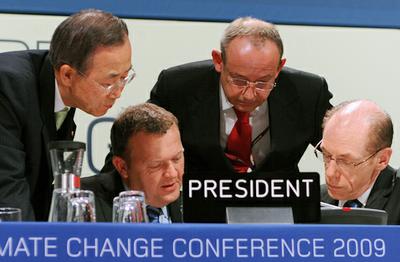 經過整夜馬拉松式會議,194國代表於聯合國氣候大會會議上決議,將「哥本哈根協議」(Copenhagen Accord)以附註方式(take note)加入會議結論。這份協議為18日由美、中、印、巴西與南非等五國提出,且該文件並不具法律約束力。
經過整夜馬拉松式會議,194國代表於聯合國氣候大會會議上決議,將「哥本哈根協議」(Copenhagen Accord)以附註方式(take note)加入會議結論。這份協議為18日由美、中、印、巴西與南非等五國提出,且該文件並不具法律約束力。
哥本哈根會議原本預計於上周五(18日)落幕,然而由於數個開發中國家的異議,因此會議延至19日。反對哥本哈根協議的國家包括玻利維亞、古巴、蘇丹、吐瓦魯與委內瑞拉等;反對原因是由於該協議缺少宏大的減碳目標。
在哥本哈根協議架構下,包含美國在內的已開發國家將在2010年2月1日前,訂出2020年前減碳目標的範圍。這將是首次美國正式做出減碳目標的承諾。減碳承諾與作為都將受到國際監督與驗證。哥本哈根協議中也同意,努力控制全球升溫不超過攝氏2度。
然而協議中對於兩項避免氣候變遷危機的重要議題並未達成共識。其一為長期減量目標-即2050年全球削減50%溫室氣體;其二為全球排放量應於2015-2020年間達成最大值,並逐年下降。
根據IPCC,上述兩個條件是將大氣中溫室氣體濃度維持在450ppm,同時避免全球均溫較工業時代前升高兩度的必要條件。
即便如此,哥本哈根協議的確對開發中國家提供技術移轉與能力建構等支持勾勒出藍圖;同時提出一套財務機制,以協助開發中國家進行調適與低碳經濟。
總額300億美金的「哥本哈根綠色氣候基金」將立即上路,提供2010-2012年的資金。已開發國家同時也支持2020年前「共同募集」1千億資金予開發中國家。
公民團體對於「哥本哈根協議」有著許多不同的看法。
歷史最久、規模最大的環境組織--世界自然保育聯盟(IUCN)表示,該協議是減緩氣候變遷這個影響全球人類、生態系與生物多樣性事件有效的第一步。IUCN同時肯定哥本哈根會議在保護森林方面的進展。「減少毀林及森林退化造成的溫室氣體排放」(REDD)近來是談判中進行較順利的議題,目的是由富國協助開發中國家保護森林。
世界自然基金會(WWF)發布聲明指出,哥本哈根會議「離全盤失敗只幾寸之遙」,這應歸責於領導無能跟雄心不足。
IUCN及WWF兩個組織都呼籲各國接著仍應致力簽訂有法律約束力的條約。
此外,澳洲最大的環保組織-澳洲保育基金會(Australian Conservation Foundation)宣稱該協議「薄弱地令人失望」。該基金會執行長亨利(Don Henry)表示:「這是一個很難達成目標的協議。該協議只承諾不升溫超過2度,但要如何達成這個承諾的困難決定將延宕到明年會談討論。」
美國「地球之友」荷瑪(Kate Horner)表示,「這裡是聯合國;但各國對於這個暗地裡做成的宣言無法產生統一的意見。這個由美國策劃且被視為歷史性成功、卻沒有效力的宣言,反映了對多國協商程序的輕蔑。我們對諾貝爾獎得主的總統先生有更高的期望。」
下一屆聯合國氣候會議將於明年12月於墨西哥城舉行。
Early this morning, delegates representing 194 countries agreed to "take note" of the Copenhagen Accord - the result of two weeks of talks and two years of negotiations. The document, drawn up Friday by leaders from the United States, China, India, Brazil and South Africa, is not legally binding.
The Copenhagen climate change conference was scheduled to end on Friday, but talks continued until today because of the disagreement of several developing countries, including Bolivia, Cuba, Sudan, Tuvalu and Venezuela. These countries said they could not accept the Copenhagen Accord draft because it lacked ambitious targets for reducing carbon emissions.
Under the Copenhagen Accord, developed countries, including the United States, will outline a range of emission reductions targets up to 2020 by February 1, 2010. This will be the first time the United States has committed itself to a formal emissions reduction target.
Both commitments and intentions in terms of greenhouse gas reductions will be subject to international monitoring and verification.
Countries accepted to work towards limiting the rise in global temperatures to below two degree Celsius above pre-industrial levels.
But there was no agreement on a long-term target of a 50 percent cut in global greenhouse gas emissions by 2050 to avert dangerous climate change, and no agreement that global emissions should peak by 2015-2020.
Both of these conditions are, according to the Intergovernmental Panel on Climate Change, necessary to achieve stabilization of greenhouse gas concentrations at 450 parts per million and to avoid global temperature rises of more than two degrees Celsius above pre-industrial levels.
The Copenhagen Accord does outline support for technology transfer and capacity building for developing economies while putting forward a financial package aimed at assisting developing ones adapt to climate change and to begin de-carbonizing their economies.
A Copenhagen Green Climate Fund of $30 billion, covering the period 2010-2012, will be available immediately, and developed nations also supported a "goal of mobilizing jointly $100 billion a year by 2020 to address the needs of developing countries."
Citizens groups reacted to the Copenhagen Accord from a wide variety of viewpoints.
The International Union for the Conservation of Nature, the world's oldest and largest global environmental organization, called the Accord "a first and useful step to slow the course of climate change ?a threat that is already affecting people, ecosystems and biodiversity in many parts of the world."
The largest Australian environmental group called the Copenhagen deal "disappointingly weak."
"This is a wing and a prayer deal. While it does commit to keep warming below 2 degrees, it leaves all the hard decisions on how to get there to the fate of ongoing negotiations next year," said Don Henry, executive director of the Australian Conservation Foundation.
Kate Horner for Friends of the Earth United States said, "This is the United Nations and the nations here are not united on this secret backroom declaration. This toothless declaration, being spun by the U.S. as an historic success, reflects contempt for the multilateral process and we expect more from our Nobel prize winning President."
The next annual United Nations climate conference will be held in December 2010 in Mexico City.
全文及圖片詳見ENS







